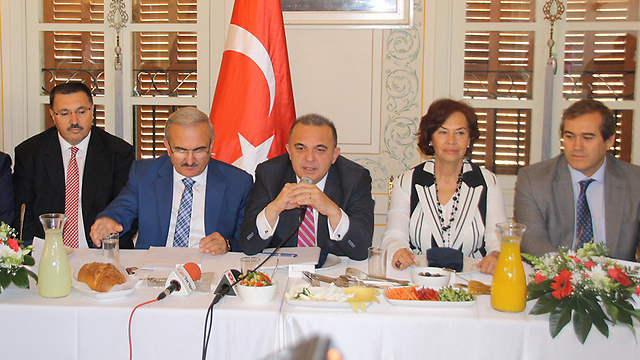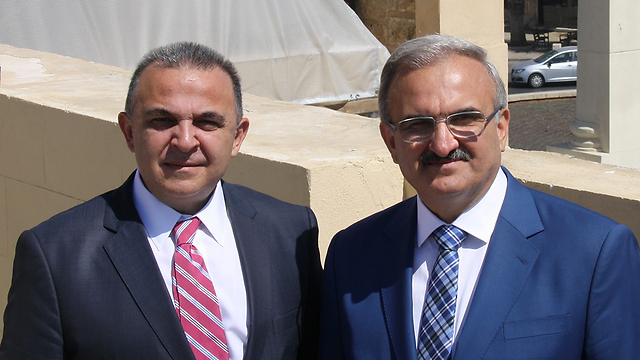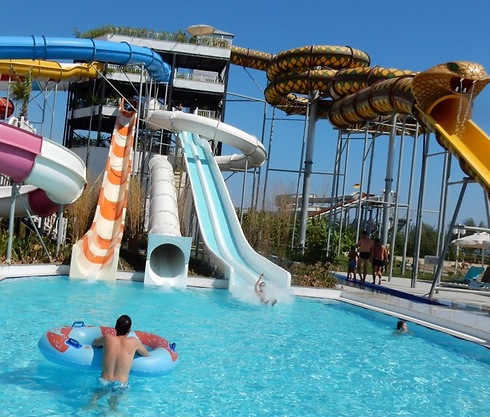In 2016, following the improvement in relations and the reconciliation agreement signed between the two countries, there was a 60% increase in the number of Israeli tourists in Antalya, reaching 170,000 people. However, that is still only about half of the 330,000 Israeli tourists who visited Antalya in 2008.
As part of their stay in Israel, the Turks will meet with travel agents and representatives from the Tel Aviv and Central Chamber of Commerce, as well as senior Israeli officials. Governor Karaloğlu called on Israelis to return to Antalya, saying, "I came at the height of the tourist season to strengthen the connection between Antalya and Israel, Tel Aviv is closer to Antalya than Ankara and we want you as our guests, not just as customers."
Israelis discovered Antalya at the end of the 1990s and found a host of advantages—a short flight, "all-inclusive" hotels that are suitable for children, abundant shopping, food for the Israeli palate and all at especially favorable prices compared to other resorts around the Mediterranean.
But in 2009, relations with the government of Recep Tayyip Erdogan, culminating in the Mavi Marmara flotilla affair in 2010, began to deteriorate, and the diplomatic crisis led to a long boycott of most of the largest unions in Israel, which refrained from sending workers to vacation in Turkey.
Antalya is now forced to compete with destinations that have become popular in recent years and have been a substitute for the banned resort town such as Greece, Malta, Turkish Cyprus, the Black Forest and more. Governor Karaloğlu knows this and counts the advantages of his resort town: "We have the best quality hotels, the best prices and the best service, and the tourism agents know exactly what Israelis like, what they like to eat, where they love to travel etc. Both peoples know each other. "
While political relations have improved, most of the tourists are now concerned about the security situation in Turkey following a series of terrorist attacks in the years 2016-2015, in which 400 people were murdered. One of the attacks—a suicide bombing in Istanbul in March 2016—was even directed against participants of a culinary tour from Isrmezz, claiming the lives of three of them. Antalya itself experienced an exceptional incident when two rockets fired from Syria exploded near it last October and struck another blow to tourism to the city.
As a result, the Counter-Terrorism Bureau issued a travel warning to Turkey, which is defined as the second most dangerous threat. The headquarters recommends avoiding visits to the country and Israeli tourists currently in Turkey are asked to leave as soon as possible.
Turkey's ambassador to Israel, Kemal Öktem, responded at a press conference held today at the Turkish Cultural Center in Jaffa. "We guarantee full security for Israelis visiting Turkey," said Öktem. "Turkey is a safe country and its situation is no different from any other place in Europe, and I suggest that you turn to those who issued a travel warning and see why it exists at all. It is not necessary. Terrorist attacks do not occur only in Turkey, they occur everywhere, including capitals and tourist attractions in Europe, and no country in the world is immune from terror threats."
But the political relations between the two countries are experiencing ups and downs, despite the reconciliation agreement, when only two weeks ago President Erdogan launched a harsh attack on Israel following the approval of the Muezzin law and said that his country would not allow the silence of the prayers in Jerusalem. He also called upon Muslims to come en masse to visit the city in order to strengthen the Palestinians. This development could once again alienate Israelis who already thought that relations between the two countries were on the way to recuperation.
"Our position on the Israeli-Palestinian conflict will not change," said Öktem. "We support and will continue to support a two-state solution that will live in peace and security side by side, and I do not see a connection between this and tourism. There are many other countries in the world that support a two-state solution, and Israelis are happy to visit them."
"Even at a time when there were minimal diplomatic relations between Israel and Turkey, trade between the two countries more than doubled, from $2.5 billion in 2008 to $5.6 billion in 2015. We need to focus on business and maintain contact between people who will bring greater understanding to the political sphere as well. The relations between Israel and Turkey are flourishing."
Today, Turkish Airlines and Pegasus Airlines operate about 100 regular round-trip flights between Istanbul and Israel. In the summer season, which starts now, regular flights and charter flights to Antalya are also available. "We have a common interest - we want to improve not only the attitude between Israel and Antalya, but also vice versa. We want tourists from Antalya to come to Israel," said the governor of Antalya.
The current visit is the direct continuation of the visit of the Turkish Minister of Culture and Tourism, Nabi Abaki, to the annual International Tourism Exhibition IMTM this February, where he met with Israeli Tourism Minister Yariv Levin.
(Translate and edited by N. Elias)




















